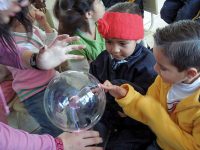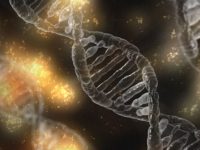Interview with John Sutherland
«I think people have underestimated the potential of what chemistry can actually do»
Researcher at the Medical Research Council (United Kingdom)
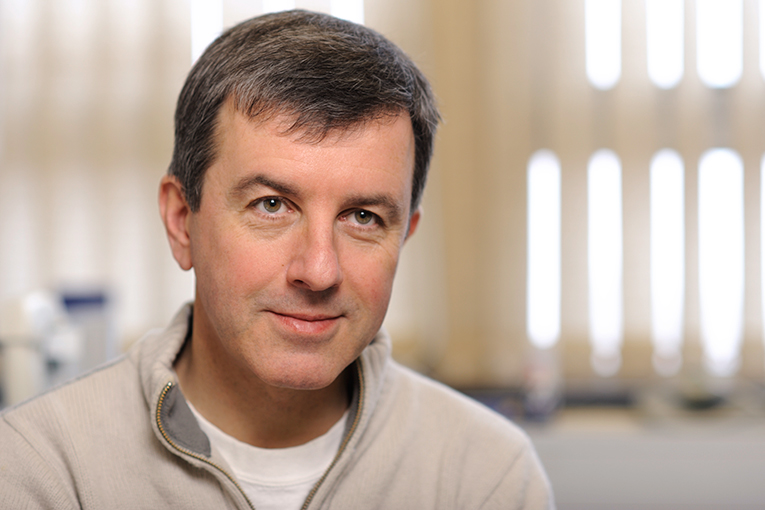
From his laboratory of the Medical Research Council (United Kingdom), the chemist John Sutherland (Bristol, 1962) explores the chemical origins of life, a topic that has fascinated him since he was a kid.
He develops his research as the Head of the Chemical Origins of Molecular Biology group, but he recognises that research cannot advance unless it receives contributions from different fields. He talks about multidisciplinarity and other issues related to his work.
It is a bright and cool spring day. We walk through the streets of the old Cambridge, the same ones that privileged minds like Newton, Darwin or Crick saw. We head towards the outskirts after walking through some college gardens, where chromatic competence among flowers has already exploded. We approach the biomedical campus at the Addenbrooke’s hospital site, a developing area for research institutes and biotechnology companies. There it stands the impressive, spectacular new building of the mythical Laboratory of Molecular Biology from the Medical Research Council (MRC-LMB): 27,000 square meters dedicated to the most advanced research. From a top view, the building has a chromosome shape, and more than 600 people work here. The MRC is famous for giving researchers freedom to develop long-term projects, without the pressure of immediate applicability. That is why Francis Crick and James Watson discovered the double helix of DNA, or Venki Ramakrishnan revealed the structure of the most fascinating molecular robot, the ribosome. But biomedical applications are not left behind: a substantial amount of the 300 million euro spent in this building, opened in 2013, were funded by the incomes generated by patents on monoclonal antibodies invented by César Milstein. This is a successful model to promote research of the highest quality. Crick, Watson, Ramakrishnan, Milstein, all of them were awarded the Nobel Prize. A Nobel prize on each floor, as they take pride of.
Now we are walking along one of the arms of the chromosome, through laboratories of the Protein and Nucleic Acid Chemistry division and we arrive to the realms of the Chemical Origins of Molecular Biology group, almost without realising, since here there are no divisions among groups; laboratories are an open and continuous space, like science itself. Hanging on the walls there are caricatures of cans of prebiotic soup or asteroids crushing on the primitive Earth. The laboratory displays all the glass paraphernalia of organic chemistry: flasks, evaporators, distillators and coils. We find the group leader, John Sutherland, having a lively chat with his collaborators. After polite introductions, he invites us to get in his rather small office, dimly lit, because the intelligence of the brand-new building decides that we don’t need more light for our conversation. Sutherland is a man with elegant manners and kind smile that inspires trust. He talks calmly, moving his hands smoothly, and he does not avoid any topic. On his desk, several photo-frames of his two daughters, and his computer screen is always ready to show us graphical clues over his words.
«Chemistry has the potential to answer the biggest question of the lot, which is how life emerged. There is no proof of the Big Bang in absolute terms, but we will experimentally demonstrate how life originated»
As a person involved in research concerning origin of life, do you feel necessary to define what is life?
That is a really good question as there is a whole series of definitions of life. I discussed this in a memorable lunch with two smart friends of mine, Robert Pascal and Addy Pross. We were writing definitions on paper towels in a restaurant. Rather than a definition, we agreed we should be talking about aliveness, which would be graphically represented at the bottom as what everybody would agree is not alive, and at the top as what everybody agrees is alive. And in between is where the debate is, overall, knowing how to go from one state to another: going up in a diagonal line progressively all the time? I doubt it. Going along and then up? It does not seem plausible either. Rather, you have evolutionary innovations, which raise the system from an inanimate state in equilibrium to a higher state of partial aliveness, far from equilibrium. To identify these discrete transitions, these steps, is our goal.
In which step would you place your research?
We study how the simplest monomers would emerge to build the primitive cells: amino acids (protein monomers), nucleotides (monomers of nucleic acids), and lipid components of membranes, all what constitutes the chemical basis of life.
So you explore the chemical origins of life. Will we ever know when it happened?
Not exactly how it happened but how it could have happened in very specific chemical terms. I think the reason why people have had uncertainty about how clear it is going to be is just because they underestimated the potential of what chemistry can actually do. Chemistry has the potential to write most of the rules for biology, such as, the subsystems of structural and cellular biology interact and get integrated in more complex systems. Physicists have very good questions; for example, the origin of universe. Biologists can address huge questions, related to cancer or evolution. If you look around the place, most people say chemistry deals with details, generates new materials, for example. But chemistry has the potential to answer the biggest question of the lot, which is how life emerged. There is no proof of the Big Bang in absolute terms, but we will experimentally demonstrate how life originated. That will be chemistry’s greatest contribution to natural sciences.
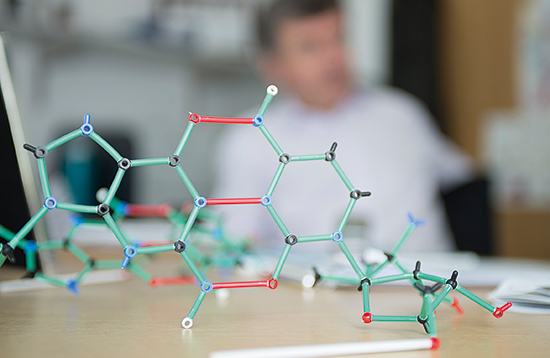
MRC Laboratory of Molecular Biology
In any case, it does not seem possible to solve it solely from a chemistry approach.
I said «natural sciences». We now have these divisions between departments, institutes, laboratories, which is so artificial. Whereas if you want to solve a problem, and the problem is the origin of life, you need to understand planetary formation, you need to know asteroid and comet collision history, you need to know about inorganic, organic and physical chemistry, you need to know about biology… So if you were building an institute of the origins of life, that institute or collection of people would cross all the boundaries. Ironically the evolution of research and teaching at universities is not the ideal structure to apply to the question of the origin of life.
However, you have found here at the MRC-LMB, a centre of molecular biology, the suitable environment and support. How do you justify your research on the origin of life surrounded by scientists working on biomedical questions?
Half of my own research is funded by the MRC. This is a particular institution that, from the beginning, has relied on high-quality research, without worrying too much about early publications. So in the MRC they have a portfolio of projects, some of which are basic science, make more immediate contributions to health, some may make a contribution in the long term, and others more applied. Let me give you the example of Francis Crick. His study of the structure of DNA was in no way motivated by any consideration of money or to improve human health. His motivation was simply to know how biology worked and he was allowed by the MRC free reign to pursue something just out of interest. And what he found has had enormous value in treating human health. Now, how does my research fit here? Because if you want to improve on health, you have to understand biology. If you want to understand biology, as we said, you have to understand the history, and the history includes the origin. So I am interested in understanding the chemical origins of biological components.
The MRC model is not very common…
No, unfortunately not. In UK and US there has been an unfortunate change. People are seeing education as a means of fuelling the economy and science as a way of producing money.
You said half of your funding is from the MRC, where does the other half come from?
The other half is funded by philanthropic organizations in the States, especially the Simons foundation. We do not have these philanthropic organizations in Europe. European institutions, such as the European Space Agency (ESA), do not fund research on the origin of life. This is also different to the US and NASA. For a very small fraction of a percent of what ESA spends on space research, a European network of high-quality research on the origins could be funded. Why do we not set up a European Centre on the origin of life research, making the most of the facilities of the Astrobiology Centre in Madrid? It would be a great initiative because I do believe in a more united Europe.
«Science must be treated the same as other aspects of culture that are stimulating the human being. Of course, there is a dirty side of science, like there is a dirty side of literature or music»
Why are there differences between US and Europe in promoting research as important as the chemical origins of life?
Nowadays, we are in hands of people obsessed in balancing the books. This impacts directly on considering funding research only if it yields short-term results and it is immediately profitable.
In Mètode we are aware of this issue because the journal explores interactions between science and other human aspects, such as art or literature.
I completely agree. Science must be treated the same as other aspects of culture that are stimulating the human being. Of course, there is a dirty side of science, like there is a dirty side of literature or music: you can make money with all those activities, but it should not be the most significant aspect. It is a personal opinion, but many people are now thinking that politicians in this country have emphasized money too much. My sister, my brother and me went to university, and got PhD degrees without paying taxes. Now people are asked to pay a huge amount of money. Attending school and university is something that must be paid by society. Now every country must be competitive, but if one country is doing something wrong, you are not committed to do something equally wrong.
In 2014 you received the Darwin Medal from the Royal Society. This distinction is awarded to outstanding scientists in the fields that Darwin studied.
It was very nice. And funny too: my wife told her father that I was awarded a Darwin Prize (instead of Medal) and he was amazed because that is a prize awarded to the person who has died in the most stupid way, so the prize is for the good of species [laughs].
Luckily that was a funny misunderstanding! But awarding you the Medal means that the Royal Society does not agree with some scientists, like Andrew Moore (editor-in-chief of the journal Bioessays), who thinks that research on the origin of life is too speculative to be part of evolutionary biology.
This is a good point. This is a very controversial statement. The ultimate objective of our research is to experimentally demonstrate that life can start from non-living systems. If you find specific conditions that can reproduce it, this becomes a proof of this being how it happened. Now, that might not be an absolute proof, but in all areas of science no one has legal proof: physicists have explained the big bang and they cannot experimentally reproduce it, or at least I hope they cannot! [laughs].
When did you decide to study chemistry?
I wanted to be a chemist from a very young age. My father and my godfather were chemists, and my brother and sister and I all became chemists, we all became organic chemists. I was always interested in how life started, and I was advised that the best way of studying it was to study chemistry.
Did you have good teachers?
At the University of Oxford I was taught by two really good tutors: the biochemist Gordon Lowe, and also by Peter Atkins, a very good physical chemist who happened to be also an extraordinary reductionist. And before starting my PhD, I went to Harvard to work with Jeremy Knowles, who was not only a brilliant scientist but also had an amazing ability to explain science in simple terms. It was impossible not being influenced by him. I did my PhD in Oxford with Jack Baldwin, a heavy weight of European organic chemistry at that time. He happened also to be interested in the origin of life. In the 1980’s there was a group of chemists interested in evolution, among which outstand Albert Eschenmoser…
More than the biochemists?
Undoubtedly. The interest of organic chemists in biological questions was natural if you want to explain subtleties in pure chemical terms. It is also normal that biochemists are more focused in understanding how biology works. But do not forget that the deep understanding includes the history.
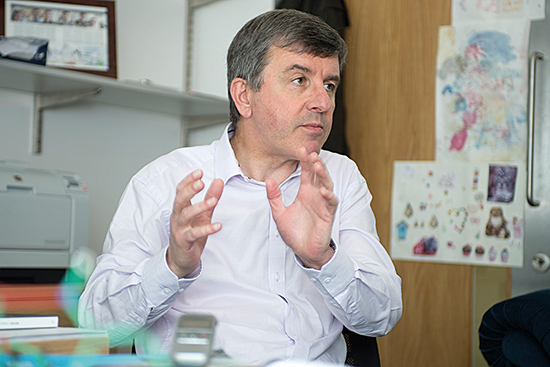
MRC Laboratory of Molecular Biology
Did Eschenmoser also inspire you?
Much more than that. Prizes are very nice to get but what is even more pleasant in life is if a scientist you happen to respect turns around and says they like what you have done. He wrote telling me he liked the work we were doing. He had a career as a chemist and he could synthetize vitamin B12, a really tough molecule to make. When he synthetized it, he realised that there were certain attributes of its structure which were indicative of a predisposed chemistry. If you look at a complicated molecule, the fact that you find it difficult to remember and draw does not make it complicated. Complication is a lot of other things. Eschenmoser realised that all that applies to complicated molecules such as B12 could be also true for other molecules like RNA precursors or molecules which seem complicated but can be generated from simpler things, easy to assemble. Eschenmoser and his works were my definitive inspiration: if it self-assembles easily, that is the right definition of simplicity, however complicated it looks. In addition to his scientific talent, he is a very civilised person. I keep a whole file of his papers just because they need to be regularly read. Some of them are 100-pages long, which have footnotes, which contain so much information. And I keep the reprints dedicated by him with great affection.
How important is in the origin of life to make science accessible to the general public?
It is paramount. One reason is that it is our duty with people to explain what we do in the laboratories. But we need to avoid the jargon and, especially, the temptation to impress your colleagues. I call it the Paganini syndrome, who wrote very difficult pieces, not to be liked by the public but to challenge the virtuoso skills of other musicians.
But in a field that generates so much interest and many expectations as the origin of life or life outside the Earth, are not there more risks with exaggerations by journalists?
It is true that although you make efforts to explain the limitations and meaning of your research, you cannot control the enthusiasm of the editor writing an exaggerated headline.
A topic that journalists really like is panspermia, the arrival of life on Earth from other planets. How likely do you think is this idea?
None. I do not see any reason to invoke panspermia because we have not yet explored the possibilities for it to occur without panspermia. When someone tells me we cannot rule it out, I answer that it is too early to rule it in. Scientists try to explain something using all the facts at their disposal and making the simplest explanation possible that is consistent with the facts. I think if we apply that Occam’s razor type of thinking to the origin of life, we do not have any reason to consider panspermia, yet.
Are you aware that creationists use your work to justify the need of an intelligent designer in the origin of life?
Yes, I am. But even if one does experiments that show that life can originate in a laboratory, I do not think that rules out the existence of God to certain people. I do not view it as my role in life to go and tell other people what they should believe. I should let people know what I am doing. The fact that we know that we go to our graves not understanding everything does not mean that we have to buy into a concept that does explain everything for us. And people are free to make the decisions they want to make. Unlike those with a religious thinking, scientists are happy because we do not understand everything and we agree to disagree.
Would you like to answer the Proust questionnaire.
Please no, I do not. Do not make me choose between things that I do not want to choose… what is my favourite music? There is different music for different moods. I could now delightfully listen to Bach, but I love the French chanson. Please, do not make me choose.
What about your favourite molecule?
One? Many! My favourite molecule is a collection of molecules. So the sum is more than the constituent parts. Would you also like to know what is my favourite child? My favourite child is my two children! Apart from being a scientist, my favourite occupation is being a father.

Systems chemistry: Prebiotic chemistry’s newest shortcut Sutherland, pioneer of systems chemistry, insists that the term was introduced by von Kiedrowski at a meeting in Vienna, when he put together a group of experts to talk on systems, but also because systems biology started to get lots of funding.
What is systems chemistry?
Organic chemistry started with simple reactions. I see systems chemistry as a multi-component one, from which new properties emerge. I understand that this will not impress who has been working with chemistry mixtures all their life. But in prebiotic chemistry this is a new approach.
In this way you solved, in 2009, what scientists like Miller or Orgel considered being a big problem, the synthesis of nucleotides.
Yes, but let me explain the meaning of that work. Organic chemists learn to make molecules at university. They look at the molecule and try to deconstruct it mentally into smaller parts, which have the potential to come together to make the larger one. When you look at a nucleotide, the most obvious disconnection is to see a phosphate, a sugar and a nucleobase, and mentally you assemble the three parts. Orgel was a brilliant scientist, trained as an organic chemist, and Miller was also a brilliant scientist, but he was not trained as an organic chemist. They devoted a large part of their career to try making nucleotides, but they did not approach it as a classic organic chemist would have done. And they should be remembered more for the brilliant things they did rather than for what they did not manage to do. A classic organic chemist would have explored the most obvious disconnection and when it did not work, he would have looked further disconnections. We came along as classically rained organic chemists, and we said, OK, if the most obvious way to make it does not work, we have to explore other disconnections. We were very lucky. To be honest, it was a big discovery for the origins community, but it is not so much from the organic chemistry point of view.
Your work from 2015 on the synthesis of a variety of precursors points out that ultraviolet (UV) light is essential.
Absolutely.
Therefore, can we discard deep-sea vents as the cradle of life?
The chemistry we have discovered imposes environmental restrictions. We start something very simple, one-carbon molecules, and we try to convert those into many other molecules, under a particular set of conditions, and then we find geochemical scenarios that would be consistent with the operation of this chemistry. We have been doing lots of chemistry during more than 20 years before we made an environmental hypothesis. And what has been implicated about this scenario is the undoubted importance of UV radiation. Reactions should have happened on the surface, or in very shallow water, to assemble monomers. Deep-sea hydrothermal vents do not do that for us. Now, when monomers go to polymers it might be elsewhere…
«It is paramount to communicate science to the public. But we need to avoid the jargon and, especially, the temptation to impress your colleagues. I call it the Paganini syndrome»
Actually, some colleagues criticise your work because you have to change conditions to arrive to the final products, because they are not one-pot reactions.
Our thinking was influenced by the pioneers of the prebiotic chemistry. We tried to make it work in one pot, and it does not. But there is a difference to previous separate scenarios like when people made nucleobases from hydrogen cyanide and they needed formaldehyde chemistry to make sugars, and these chemistries had to be separated because they are incompatible. Our chemistry has a different principle. The processes take place with reasonable environmental changes. In musical terms, they are variations of the same theme.
Regarding Darwin’s metaphor about the «warm little pond» where life emerged, how warm and how little do you think it was?
Temperature would fluctuate, and it could be incredibly little. Our work points towards a surface with debris from a meteorite impact, not too big. But we need to be cautious with our conclusions.
Oparin and Haldane viewed the artificial synthesis of cells as the ultimate goal of this research. When will we have protocells built in a laboratory?
People like Szostak are enthusiastic about protocells. I think we work on the same problem, but at different levels… I cannot guess. We cannot make headlines like that… If you think how cathedrals were built, people who planned to build the foundations were dead before all the magnificent structure of the cathedral was ever seen. It would be career well spent if I would put the foundations of a protocell.

